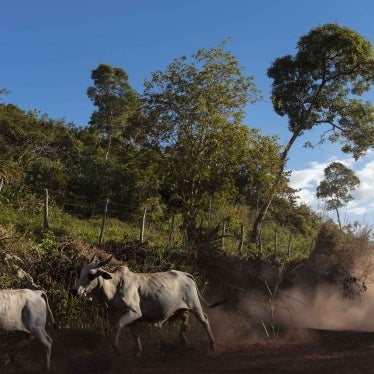A new treaty to deepen the link between environmental protection and human rights in Latin America and the Caribbean has the potential to reduce the conflicts that lead to the murders of so many environmental defenders in the region.
The signing ceremony for the Escazú Agreement took place at the Headquarters of the United Nations in New York on September 27. Heads of State and ministers of 15 countries arrived to the ceremony: Antigua and Barbuda, Argentina, Brazil, Costa Rica, Dominican Republic, Ecuador, Guatemala, Guyana, Haiti, Mexico, Panama, Paraguay, Peru, Saint Lucia and Uruguay.
It was a highly symbolic and significant moment for the millions of people in the region who suffer the consequences of pollution and pressure on natural resources.
I am thinking of Isidro Baldenegro López, leader of the Tarahumara indigenous people in Mexico’s northern Sierra Madre mountain region. He dedicated his life to defending the Sierra Tarahumara forest and the land that his people had inhabited for centuries and was shot dead in January 2017. Or take the case of Agustín Wachapá, a Shuar indigenous leader who opposes mining in the Ecuadorian Amazon. He endured a 17-month ordeal after he was charged with inciting violence after a December 2016 clash with the police over a mining project, even though the prosecution presented no meaningful evidence to support the charges. Or the pervasive climate of fear and impunity felt by members of indigenous communities who organize to defend the Amazon forest in the Brazilian state of Maranhão, and who face threats and intimidation by illegal loggers.
The first steps on the road to Escazú - the place in Costa Rica where 24 countries from the region adopted the agreement on March 4 - go back to the UN Conference on Sustainable Development --Rio +20, in 2012. There 10 countries from the region, led by Chile and Costa Rica, initiated a process toward a regional agreement on people’s rights to information, participation and justice in environmental matters.
As early as 1992, at the Earth Summit in Rio de Janeiro, the participants had proclaimed these environmental rights as the cornerstone of sustainable development. In 1998, Europe incorporated those rights into its treaty, the Aarhus Convention.
The Escazú Agreement follows the Aarhus model. At its core, Escazú sets standards for informed participation in environmental decisions and access to environmental justice. The agreement guarantees the public's right to information on environmental issues, while at the same time ensuring their right to informed participation in the environmental approval process for investment projects. The agreement also eliminates obstacles to environmental justice, including requiring support for people or groups in vulnerable situations.
In certain respects, Escazú goes beyond Aarhus. For example, it recognizes the right to live in a healthy environment and requires each participating country to guarantee that right in its steps to comply with the treaty. As this right has not yet been recognized at the global level, Escazú may help push the rest of the world to fill that gap.
Reacting to the dramatic increase in environmental conflicts in the region, Escazú is also the first international treaty that includes specific protections for environmental defenders. As Michel Forst, a United Nations human rights expert, has made clear, the threats, aggression, and fatal attacks on environmental defenders are often a direct result of the exploitation of natural resources that does not take into account the legitimate demands and concerns from local communities.
Measures to protect environmental defenders are a step in the right direction, offering hope to individuals and groups that defend the environment and their communities, and that are under threat in the region.
The road to Escazú was marked by more than five years of hard work after Rio +20, marked by an intense dialogue between the countries and nongovernmental groups in the region. Few international negotiations open up like this to allow the public to take the floor in real time and enrich the debate with their ideas and proposals.
The dialogue and the effort paid off. Escazú’s new tools for international cooperation will strengthen the capacity of countries to achieve global goals, such as the sustainable development goals of Rio +20 and the climate change commitments of the Paris Agreement.
However, despite its benefits, an international treaty is not a magic recipe. The acute environmental and human rights problems of a region as diverse and complex as Latin America and the Caribbean require intervention from a variety of angles. However, civil society in these countries has great hopes that a binding agreement such as Escazú, in which the environment and human rights go hand in hand, can be a milestone on the road to ending the region’s environmental conflicts.
The countries of Latin America and the Caribbean should sign and ratify the Escazú Agreement, and so take advantage of this landmark opportunity to signal a real commitment to sustainable development, human rights and democracy.








